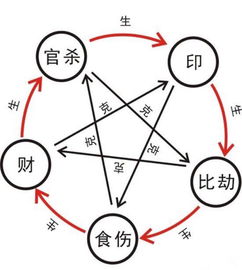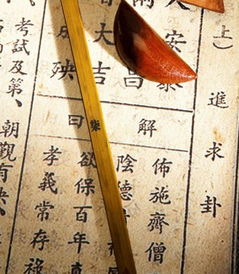Horoscope is a kind of fortune-telling technique handed down from ancient times, which analyzes the combination of Heavenly Stems and Earthly Branches of the year, month, day and hour of birth in order to speculate on a person's personality, destiny and the direction of his or her fortune. An important element in the Bazi is the Ten Deities. The Ten Deities is an element of the Eight Characteristics used to describe the interrelationships and interactions between the different Heavenly Stems. In the Eight Character, there is a corresponding Ten Deities between each Heavenly Stem and the other Heavenly Stems. So how many Ten Deities are there in the Eight Characters?
There are 10 Heavenly Stems in the Eight Characters, which are Zi, U, Yin, Mao, Chen, Si, Wu, Wei, Shen, You, Huxu, and Hei. And the interrelationships between the heavenly stems can be divided into eight relationships: hexagram, criminal, impulse, harm, official, seal, wealth and food. These eight relationships are the ten gods in the eight characters.
The hexagram relationship in the horoscope. Hexagram relationship refers to the harmonious relationship between the Heavenly Stems, supporting and helping each other. Depending on the order between the Heavenly Stems, the Six Harmonies relationship can be categorized into three pairs: A-Hex, B-Gung, C-Sin, D-Non-Harmony, and E-Kei-Harmony. This relationship usually indicates that the other person is a helpful friend, able to give help and support.
Penal Relationship in Horoscope. Penal relationship refers to the relationship between Heavenly Stems that are mutually restraining and fighting with each other. The main types of penal relationships in the 八字 are: A Yin Interposition, B Mao Interposition, C Si Interposition, Ding Wu Interposition, E Si Interposition, Hei Shen Interposition, Geng Shen Interposition, Xin Nian Interposition, Nian Hai Interposition, and Dec Hai Interposition. This kind of relationship usually means that the presence of the other party will bring trouble and obstacles to oneself, and one needs to be vigilant and responsive.
Again, the Chong relationship in the Eight Characteristics. Charge relationship refers to the relationship between the heavenly stems that are in opposition and conflict with each other. Charge relationship in the eight characters are: Zi Wu Chong, U Wei Chong, Yin Shen Chong, D You Chong, Chen Xu Chong, Si Hai Chong. This kind of relationship usually indicates that the other party has a strong fight and confrontation with oneself, which may bring adverse effects.
Harmful Relationships in Horoscope. Harmful relationship refers to the relationship between the Heavenly Stems that are harmful to each other, harming and damaging each other. The main harmful relationships in the 八字 are A Si Harm, C Wu Harm, Geng Shen Harm, and Non Hai Harm. This relationship usually means that the other party is capable of causing harm or adverse effects to oneself and needs to be treated with caution.
Next, the relationship of the eight characters of the official, India, wealth, food. Guan, Yin, Cai, and Food refer to the relationship between the different heavenly stems. The star of Official represents power and dominance, the star of Yin represents talent and quality, the star of Wealth represents wealth and benefits, and the star of Food represents the power of restraint and subordination. These four relationships are the more complex relationships in the Eight Characters and need to be analyzed in context.
There are eight kinds of ten-spirit relationships in the eight characters: hexagram, torture, impulse, harm, official, seal, wealth, and food. These relationships play an important role in the analysis of the eight signs, and the study of these relationships can reveal a person's destiny and character traits. Different relationships represent different interrelationships and need to be analyzed and interpreted according to the specific situation.
Of course, Bazi fortune telling is a complex study, and it is difficult for those who have not formally studied and practiced it to understand and grasp the depths of it. Therefore, if you have doubts about your fate and personality, it is advisable to seek the help of an experienced and qualified teacher for a professional Bazi analysis. Through accurate interpretation and reasonable guidance, you can better understand yourself, plan your life, and enhance your happiness and success.

2. What is the meaning of the ten gods of the eight injured officials
: Numerology analysis: the significance of the ten gods and injurious officials in the eight characters is revealed
First, the background of numerology
The 八字, or Four Pillars Eight Characters, is one of the core concepts of traditional numerology. Based on the lunar calendar birth year, month, day and hour of the composition of the Heavenly Stems and Earthly Branches, each of the eight characters contains a Heavenly Stem and an Earthly Branches. According to the combination of the configuration of the Heavenly Stem and Earthly Branches, the personality characteristics, life encounters and the direction of fortune of the proposer can be deduced.
Second, the Heavenly Stems and Earthly Branches and the Ten Gods
.
1. Heavenly Stems: Heavenly Stems include ten heavenly stems, which are A, B, C, D, E, F, G, C, N, N, K. Each heavenly stem corresponds to one of the five elements. Each heavenly stem corresponds to one of the five elements, including wood, fire, earth, gold and water.
2. Earthly Branches: The Earthly Branches include the twelve Earthly Branches, which are Zi, U, Yin, Mao, Chen, Si, Wu, Wei, Shen, You, Huxu, and Hai. Each Earthly Branch also corresponds to one of the five elements. The twelve Earthly Branches and the five elements combine with each other to form the basic meaning of the eight characters.
3. Ten Gods: In the eight characters, according to the combination of the Heavenly Stems and Earthly Branches, they actually correspond to the ten gods of the eight characters, including the positive Yin, the negative Yin, the positive official, the negative official, the injured official, the god of food, the star of wealth, the star of the official, the miscellaneous qi, and the flying star. The Ten Deities reflect the interrelationships and interactions of the different stems and branches in the eight characters.
Third, the significance of the wounded official
The Hurting Official is located in the Earthly Branches of the Bazi, including the three Earthly Branches of Shen, You and Xu. The Hurt Official is usually regarded as the god of misfortune in the Eight Character Signs, which means that the fate of the proposer has a lot of ups and downs and is prone to setbacks and difficulties.
1. Opposite of Hurt Official: Hurt Official and Zheng Guan are two opposite concepts. Zheng Guan represents the authority and status of the fortune-teller, while Hurt Guan implies a weakening and destructive effect on Zheng Guan.
2. The influence of the Hurt Official's fortune: The appearance of the Hurt Official often means that the fateful owner's life path is more complicated and prone to setbacks and difficulties. In career development, the natives may encounter resistance and competition; in love life, they may experience ups and downs and trials and tribulations.
3. Ways to solve the problem of the Wounded Official: According to numerology, if the natal chart holder can strengthen the energy represented by the Wounded Official, that is, to utilize the positive effects of the Wounded Official, the negative impacts of the Wounded Official can be mitigated. Through self-regulation, the fortune teller can turn the Hurt Official into a helping hand and achieve better gains in life.
Fourth, the ten gods and personality traits
In addition to the Hurt Official, the other Ten Deities in the Eight Characteristics have their own characteristics and meanings, which affect the character and destiny of the natives.
1. Zheng Guan (正官) and Miguan (偏官): Zheng Guan (正官) represents authority and status, while Miguan (偏官) denotes foreign names and relationships with the opposite sex.
2. Zheng Yin (正印) and Mian Yin (偏印): Zheng Yin (正印) reflects knowledge and learning, while Mian Yin (偏印) suggests skills and talents unrelated to learning.
3. Gustation and Fortune: Gustation represents the desires and enjoyment of the natives, while Fortune reflects wealth and material things.
4. Guan Xing and Miscellaneous Qi: Guan Xing suggests worldly power and social status, while Miscellaneous Qi represents the native's wisdom and assistance.
5. Flying Star: The Flying Star symbolizes the natal subject's outgoing personality and pursuit of success.
5. Revelation and Research
In the development of numerology over the centuries, a rich and unique system of knowledge has been accumulated. One of the core concepts of Bazi numerology - Ten Gods and Hurt Officials - is widely used in the prediction and research of personal destiny through the analysis of the combination of Heavenly Stems and Earthly Branches.
By understanding the meanings of the Ten Deities and the Hurt Officials, people can gain a deeper understanding of their own character traits and the direction of their destiny. In the face of difficulties and setbacks, we can actively adjust our own state and find ways to solve problems through the insights of numerology, and then change our destiny.
Total Eight Fate is an integral part of ancient culture, in which the Ten Deities and the Hurt Officials are important concepts in Fate. The Hurt Officials reflect the ups and downs of the fate and the difficulties faced by the fortune teller, while the Ten Deities correspond to the character traits and the direction of a person's destiny. By understanding the deeper meanings of the Ten Deities and the Hurt Officials, we are able to better decipher the mystery of our personal destiny, guide the direction of our own lives, and realize our personal growth and happiness.

